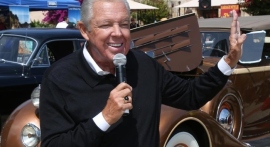
Author and apologist Sean McDowell pretended to be an atheist in front of a group of Christian youths before revealing himself in the midst of the conversation.
He was asked to speak at a Christian school in Florida for an "atheist encounter."
"Normally audiences know that I am a Christian pretending to be an atheist, but in this case, the Bible teacher insisted I go undercover as an atheist, and the response was awesome," he explained. "After about 30 minutes of role-playing, I step out of character and talk with the students about how to better engage people of other faiths."
The King's Academy in West Palm Beach, Florida, which arranged the said activity, wrote that the surprise "atheist" experience was intended to hone students' apologetics and evangelistic abilities.
Sean McDowell introduces himself halfway through the video and then leads a conversation about how such claims aren't too difficult to react to after you've understood and practiced those responses.
"So let me make two points here. Number one, you might have noticed sometimes instead of answering a question, I was like, string theory, multiverse, complex words, act as if you answer something but really didn't. I played that card a few times. Second, when you ask why somebody believes something, now you're talking about motivation, and people can have very deep reasons for their motivations," he said.
Those motivations, according to McDowell, could be intellectual, moral, or relational.
Those intellectually motivated just simply think that Christianity does not make sense. The one with moral motivation subconsciously knows the truth about God and what he expects of his children, but he'd rather stay in the dark because he enjoys certain sinful practices.
The third reason for turning to atheism is relational. Some Christians have had bad experiences in churches. When they expressed genuine reservations or concerns regarding God and Christian teachings, they were either wounded by a fellow Christian or made to sound like an alien or dissenter.
"See friends, when it comes to communication, there's two things. There's content, and then there's the way we communicate that content," he said.
"There's a truth to Christianity, but there's also a way we're supposed to communicate it. Jesus came in grace. And he came in truth. You're supposed to speak the truth but do it in love. Truth in love," he added.
The Stream noted that Sean McDowell, J. Warner Wallace, and other Christian apologists have been engaging in this exercise for years. Its purpose is to prepare young believers to respond intelligently when asked regarding their beliefs.
"Students are certain to hear atheism taught in social media, on entertainment media, and all across the college campus. If they've gone to church, they've learned truths of Christianity in church, and in some churches (not enough, sadly) they've heard some reasons to be confident it's really true. Rarely, though, will they get to practice what they're learning," reasoned the Christian news site.
According to the author, an atheist role-play is similar to a military simulation. At some point in their lives, students will meet someone who knows all the strongest reasons for atheism. Typically, they discover that they are not prepared to deal with such claims. As a result, everything falls full circle.
Furthermore, when McDowell presented his case for atheism, his live audience, as well as others who viewed the debate online, will come to understand the help that Christianity provides.


























